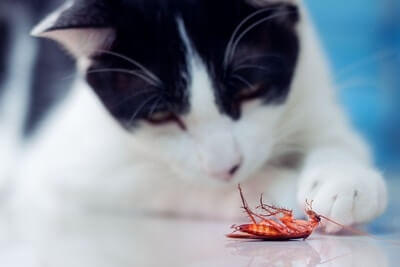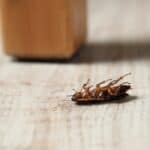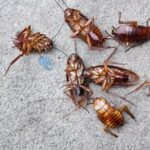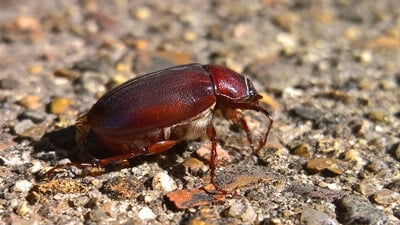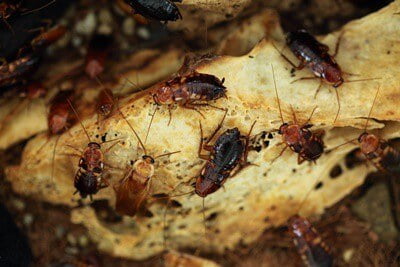Cockroaches are a pest, but killing cockroaches with chemicals or manual traps doesn’t work for everyone. If you want a natural solution, bringing in an animal that hunts cockroaches seems like the ideal solution. Among all the natural options, the most popular is cats. After all, cats have been humanity’s go-to pest-killer for centuries.
Cats don’t shy away from cockroaches. They’re mesopredators, more than willing to hunt down and kill these resilient pests. However, cats aren’t the best at preventing cockroach infestations. Even though cockroaches are high in protein, they aren’t a good food source for cats due to their tough exoskeletons cockroaches.
Cockroaches are also carriers of bacteria and parasites that can harm your cat. While cats do not attract cockroaches, you may find cockroaches around their food bowls and litterboxes. These are established food sources for cockroaches, drawing them into your home. The trick is to keep these items clean and stored properly.
Do Cats Kill Cockroaches?
Cockroaches are prey that cats will actively kill on sight. The scuttle of roaches will trigger a cat’s hunting instincts. Does that make cats good cockroach hunters?
There have been no scientific studies exploring the efficacy of cats as cockroach deterrents, just as there haven’t on whether dogs will kill cockroaches.
However, in place of scientific research, there appears to be anecdotal evidence and personal experience. Cat owners frequently document their pets’ habits of playing with cockroaches, dead and alive.
Do Cats Keep Cockroaches Away?
Felines have a long history as a form of pest control. Many breeds of cats are, in fact, cultivated specifically for their hunting instinct.
The British Journal of Animal Behavior notes a case study about neighboring farm properties. 4 of the 5 farms had cats for pest control, and one didn’t. The farms with cats were almost completely free of pests. Specifically, these included rats and other rodents. That’s because some prey animals had learned to avoid a cat’s hunting radius.
Cockroaches register most creatures larger than themselves as a threat to be avoided. A persistent cat would deter cockroaches from returning, and this may prevent their population from growing.
This is not guaranteed, nor is it as effective as other pest control methods. A cat’s presence may make cockroaches more cautious. They may skulk in the dark or hide where cats cannot reach them.
Can I Make My Cat Get Rid Of Cockroaches?
Cats may deter cockroaches, but this depends on the extent of your infestation. It will also depend on your cat and how well fed it is.
Outdoor cats can deter some animals from entering your backyard. Or, if you grow crops or have a vegetable garden, they may deter rodents and birds. Through the consistency of their presence, indoor cats can apply pressure to cockroach populations as well, but can cats get rid of cockroaches entirely?
A cat may pounce on cockroaches and occasionally kill one. However, there is no guarantee that a cat will do so. Well-fed domestic cats may have little drive to hunt. A cat may also be inconsistent with killing cockroaches, making it ineffective at getting rid of the pests.
Another element to factor in is the size of the infestation. A single cat against an established cockroach population isn’t going to affect the numbers. If you see one cockroach, there’s likely more.
Do Cockroaches Avoid Cats?
Cockroaches are small invertebrates. The main defenses that cockroaches rely on are their:
- Agility
- Tough exoskeleton
- Size
These abilities are some of the reasons why cockroaches are so difficult to get rid of. They squeeze into the smallest spaces and scuttle away at the first sign of danger.
As described in Current Biology, anti-predator behavior is vital for most animals and relies heavily on speed and agility. Cockroaches use all of these abilities to avoid anything deemed as a threat, including cats.
To what extent cockroaches avoid cats is a mystery. Cockroaches may wait for your house to be quiet before emerging. Or they may avoid the more popular rooms and stick to those left largely untouched.
It is known that cockroaches hide away while they are molting. During this period, they must wait for the fresh shell to harden. This appears to be an ingrained behavior, however. It is not directly correlated with cats but with predator avoidance as a whole.
Why Do Cats Like To Eat Cockroaches?
Ecology and Evolution stated that cats are natural predators of:
- Birds
- Herpetofauna
- Small mammals
- Invertebrates
Cockroaches are an invertebrate and a high source of protein. They are a valuable source of nutrition for many other animals, felines included. However, cockroaches are not a preferred food source for cats.
A cat may eat a cockroach that it has killed. Equally, it may not. A hungry cat may eat its prey. In contrast, a well-fed cat with a food source constantly available may only treat a cockroach as a toy.
Young cats or curious cats may chew on and eat a cockroach out of curiosity more than hunger.
Are Cockroaches Safe for Cats To Eat?
Cockroaches may be a good source of protein. However, these nutrients do not come without risks. Cockroaches are a potential hazard to your cat. The tough exoskeleton that forms a cockroach’s natural defense can be a hazard. As can the parasites cockroaches are known to carry. That’s not even accounting for pest poisons or bacteria.
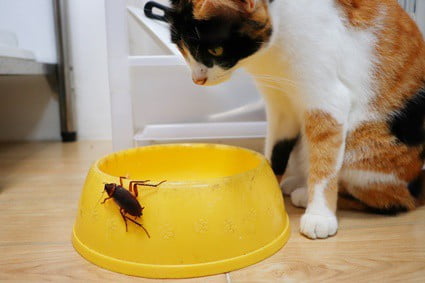
Roaches are not ideal for cats to eat. There is no way to track where the pest has been or what it has been exposed to. Beyond that, the pest is difficult for the cat to digest, which only adds to the risk factor.
That said, a cat eating a cockroach or two isn’t a cause for alarm. Unless you know it was exposed to poisons, your cat should survive eating 1-2 cockroaches without a problem.
Choking Hazard
A cockroach’s exoskeleton poses a choking hazard to cats. Even if chewed up, shards of this shell can become lodged in the cat’s throat. Aside from being uncomfortable, this can choke the cat. It can also choke the next time it eats or coughs up a hairball.
The shards may also cause injuries or lacerations to a cat’s throat. Larger cockroaches can block a cat’s throat. Cats are not able to grind a cockroach’s shell into small, non-hazardous pieces before swallowing. As such, they are unable to mitigate this particular risk, unlike other animals that eat cockroaches.
The shell can also cause oral irritation. Given the drains and garbage cockroaches often crawl through, they can be covered in unpleasant bacteria. It just takes a small cut, and a few days later, your cat can have an oral infection.
Indigestible
Aside from being a choking hazard, a cockroach’s shell is largely indigestible. The cat’s digestive juices could attempt to break down the shell. However, larger pieces will remain mostly intact. This is why your cat may vomit up bits of the cockroach it ate earlier. You may also find bits of shell in its litterbox.
Unlike other animals, cats are not able to grind up their food. Likewise, they cannot find workarounds like gastroliths and gizzard stones. Because of this, anything that the teeth and digestive acids can’t break down will pass through its system largely whole.
Any indigestible matter that passes through an animal’s digestive tract can potentially cause a blockage. This leads to several health problems, which can be severe if left untreated. It may result in surgery or medical treatment.
Poison
Cockroaches are non-venomous. They do have a mildly painful bite, which can cause some swelling and irritation. Still, venom isn’t a concern, which will be a relief to many.
However, cockroaches are an invasive pest in a lot of households and are treated as such. Lots of people have turned to chemical deterrents and poisons for culling these pests. Eating a contaminated cockroach can make a cat ill. If the cat is young, old, or already unwell, exposure to a harmful solution can require a vet visit.
Some pest control chemicals claim to be non-toxic to pets. However, directly ingesting the poison can still cause issues. A cat that smells the poison or cleans it off its paw may be fine. However, eating a full cockroach that has been dowsed, killed, or otherwise tainted by the poison can be detrimental to their system. The results may include:
- Irritation of the mouth, throat, or stomach
- Toxicosis
- Digestive distress
Parasites And Bacteria
People may find cockroaches gross and unsightly. However, their main danger to the average home is the bacteria they carry. This has, of course, led to the opinion that cockroaches are unclean or disease-ridden. To an extent, they can be. The cockroach is not naturally unclean and do clean themselves.
However, these pests will scuttle through rotten food, compost, garbage bins, fecal matter, and other unpleasant things. This coats the roaches in bacteria. Eating such an insect isn’t just exposing your cat to the bug itself. The cat is ingesting trace elements of everywhere that insect has been. This can cause stomach upset for the cat, at the least.
That’s why it’s important to keep our homes and food free of cockroaches. They pose a threat to public health. Parasite Epidemiology and Control found that cockroaches carried multiple parasites. The most prevalent of which was hookworm, found in 74% of specimens caught for the study. In a cat, signs of hookworm infestation can manifest as:
- Diarrhea
- Loss of weight
- Internal bleeding or eventual anemia
- Death
This is especially true in kittens. In the U.S., such parasites are still common. The odds of your cat becoming infected through eating a cockroach are high. It’s important to keep up with its deworming schedule.
Why Do Cats Play with Cockroaches?
Your parents likely told you not to play with your food. Cats have no such compunctions. It is a natural behavior for cats to play with living, dying, and dead cockroaches. A cat may:
- Bat it around
- Bap at it with its paws
- Flick it up into the air at random
In a way, this is hunting behavior. To minimize the risk of injury, cats use a strategy to tire out their prey by playing with it. An exhausted prey animal is less likely to strike out. Or, its strike won’t be as likely to cause injury.
A domestic cat may continue to play with its prey once it’s dead, as it does not need to eat it. This may result in the insect getting broken up into many pieces. When scattered around your home, this not only creates a mess. It can spread the parasites or bacteria that were present on the cockroach.
Cats, by nature, are also quite playful. The quick, scuttling movements of a cockroach will trigger a cat’s instincts to play and pounce. In actual fact, a lot of play behavior in cats is instinctual hunting behavior. This is why cats play with cockroaches.
My Cat Keeps Bringing Me Dead Cockroaches
If your cat brings you dead or near-dead cockroaches, it isn’t telling you that you have a pest problem. It’s a good indication of one, but it’s not the main point. Instead, this is your cat trying to teach you to be a better hunter.
A mother cat teaches her kittens to hunt by bringing them weakened prey. Your cat thinks you’re a terrible hunter and is trying to help in its way. Cats also drag their kills back to a safe place to eat them. If your cat is an outdoor cat, it may not be catching them on your property.
If you want your cat to stop, this isn’t a habit you can train out. Instead, you should limit the access it has to cockroaches. For indoor cats, this can mean seeking out other pest-control methods. It could involve keeping them inside for outdoor cats so that they can’t hunt in the wild.
Should I Take Cockroaches from My Cat?
Whether your cat is playing, actively hunting, or bringing you a gift, you have a choice. Do you let the cat keep the cockroach (which it’s earned), or do you take it away?
As mentioned, the greatest danger of cockroaches is their contaminated shells and their hard exoskeleton. So, there’s no harm in letting your cat play with a bird. However, your cat may be harmed if it’s allowed to ingest a cockroach.
Your cat may appear to bat it around with no intention to eat it. Since you can’t tell when the cat will change its mind, it’s recommended to err on the side of caution. Go ahead and take away the toy, but reward it for hunting down a pest. This can involve petting the cat, giving it a normal cat treat, and showering it with praise.
Are Some Cat Breeds Better Cockroach Hunters Than Others?
Cats have been selectively bred throughout the centuries. The goal has always been to enhance many traits, but mainly their pest-control abilities. You’ll find certain cat breeds are better pest-hunters than others.
However, this mainly concerns mice, not cockroaches. As mentioned, cats aren’t used as cockroach hunters historically or in professional settings.
Nonetheless, if you want a cat that will fend off cockroaches, where do you look? You can pick from the top mousing breeds. Here, you’ll find the same instincts cultivated to kill mice translating to cockroach-hunting. For instance:
- Dexterity – To catch small pests prone to scuttling into small spaces.
- Speed – For pests that are smaller and more nimble.
- Quick reaction time – Roaches and mice alike are good hiders, only revealing themselves with a quick scurrying movement.
- Persistent hunting instinct – Meaning they won’t give up until the pest is dead.
What breeds have the best mousing traits that crossover into cockroach-hunting? These include:
- Persians
- Chartreux
- American Shorthairs
- Burmese
- Turkish Angora
- Maine Coons
- Manx
- Siberian
- Japanese Bobtail
- Siamese
Do Cats Attract Cockroaches?
Cats themselves do not attract cockroaches. However, their food and litterboxes can if they aren’t cleaned regularly. Cockroaches are attracted to reliable food sources. Cat food bowls and litterboxes are:
- Out in the open
- Often left unattended
- Tucked away where there is little foot traffic
This makes them prime food sources for cockroaches. Storing cat food in non-air-tight containers also attracts cockroaches. Flimsy storage bags can rot or be chewed through, spilling their contents for all manner of pests.
How To Keep Cockroaches Away from Cats
To avoid attracting cockroaches, always ensure that your cat’s food dishes are clean of leftover food. If you leave dry food out during the day, consider giving your cat smaller portions in the morning and night instead. In this way, the cat eats all of the food in a short space of time. It won’t accidentally provide leftovers for pests.
Likewise, make sure that the cat’s food is stored in proper containers. Aside from keeping the food fresher for longer, it prevents cockroaches from scenting out the food. As for the litter, try a crystal litter (which is inedible for cockroaches) or increasing the frequency with which it is cleaned.
Do Cats Deter Cockroaches?
Cockroaches will flee and hide from anything deemed a threat. That includes most things larger than they are. If your cat actively hunts and kills any cockroaches it comes across, it may scare others away. However, if there is a reliable food source, the pests will be harder to eliminate permanently.
Controlling pests usually means depriving them of a home and food. As good as cats are at killing cockroaches, there are safer and more effective methods of cockroach population control.
